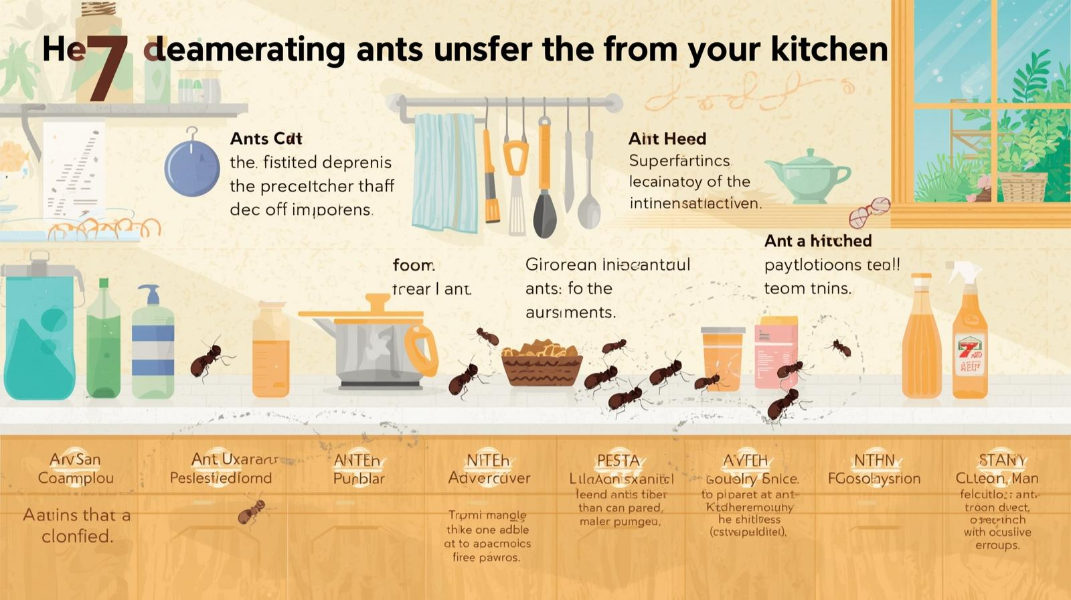There’s nothing worse than finding tiny ants marching across your kitchen counter. These pesky creatures, often appearing seemingly out of nowhere, can quickly become a nuisance. Whether you’re dealing with a few ants or a full-fledged infestation, getting rid of them is essential to keep your kitchen hygienic and comfortable.
The good news? You don’t need to call a professional pest control service immediately. With a little knowledge and effort, you can solve the problem on your own. In this post, we’ll cover 7 easy and effective solutions to get rid of ants in your kitchen, so you can enjoy a pest-free cooking space once again.
Why Are Ants in Your Kitchen?
Ants show up for three reasons: food, water, and pathways. Crumbs, grease films, ripe fruit, and pet bowls create easy calories. A slow drip under the sink or a damp sponge offers moisture. Baseboard gaps, window weeps, and utility penetrations give them sheltered routes. Scouts lay pheromone trails; once they find a payoff, the rest follow.
Season matters. After rain or in spring, colonies expand and send more foragers indoors. Species differ: sugar ants chase sweets, grease ants prefer fats, and carpenter ants signal wet wood nearby.
Short-term control starts with sanitation. Wipe oils with a degreaser, seal sugar and cereal, rinse recyclables, and empty trash daily. Fix leaks, dry the sink mat, and store fruit in the fridge. Vacuum visible trails to remove crumbs and pheromones.
For targeted treatment, use slow-acting baits matched to what they’re eating this week—protein when they’re nesting, carbs during growth. Place baits on active trails, not corners; avoid spraying over them, which repels ants and breaks the bait cycle.
Long-term prevention means sealing entry points with caulk, trimming vegetation off the exterior wall, and keeping mulch low. If swarms persist or wood feels soft, call a licensed pro.
The Search for Food and Water
Ants are persistent creatures, and their primary motivation is food and water. Kitchens are often the perfect environment for them to thrive because of the readily available crumbs, Cleaning Guide for Home & Kitchen sugary substances, and spills. Ants are especially drawn to sweet foods, but they’ll settle for fats, proteins, and even moisture if that’s what’s available.
A single dropped crumb or a spill of honey can act as a beacon, calling ants to form a trail leading straight to your kitchen. If you notice a few ants in your kitchen, it’s likely because they’ve found a food source. That’s why keeping your kitchen clean is one of the first steps in dealing with them.
Common Places Where Ants Enter
Ants don’t just appear out of thin air—they find their way into your kitchen through tiny cracks and gaps. Common entry points include:
- Doors: Gaps in door seals or poorly sealed entryways
- Windows: Cracks or damaged window screens
- Foundation: Small openings in the walls or foundation
- Walls: Ants can follow hidden paths in your walls, coming in through any small cracks.
By identifying where ants are entering, you can take steps to seal these areas and prevent further problems.
Types of Ants Common in Kitchens
Not all ants are created equal. Some of the most common types of ants that invade kitchens include:
- Sugar Ants: These are tiny ants that are especially attracted to sugary foods and drinks.
- Carpenter Ants: Larger in size, these ants are often attracted to damp wood and can cause significant damage to your home.
- Pavement Ants: Typically found in cracks on sidewalks, pavement ants can enter homes and kitchens looking for food.
Knowing which type of ant you’re dealing with can help determine the best approach to eradicate them.
Solution 1: Clean Your Kitchen Thoroughly
The first step in tackling an ant problem is making sure your kitchen is spotless. Ants are attracted to food, so keeping your kitchen clean will significantly reduce the chances of an infestation.
Clean Up Food Spills Immediately
Ants don’t need much to start a colony—they can thrive on even the smallest crumbs or spills. If you drop a piece of food, clean it up immediately. Pay special attention to places where food is regularly handled, like counters, tables, and floors.
Regularly Wipe Down Surfaces
Even if there’s no visible food on your countertops or floors, oils, grease, and small crumbs can still attract ants. Wipe down surfaces with warm, soapy water regularly to remove any residue.
Don’t Forget to Clean Under Appliances
Ants love to hide in small, hard-to-reach spaces. Areas under your fridge, stove, or microwave are prime real estate for ants looking for food or moisture. Clean under and around these appliances every few weeks to ensure you’re not giving ants a hidden home.
Solution 2: Seal Entry Points
As we mentioned earlier, ants can enter through tiny cracks and gaps. Sealing these entry points is a key step in preventing ants from coming back.
Identify Potential Entry Areas
Take a walk around your kitchen and home to inspect possible entry points. Look for cracks around window sills, doorframes, and in the foundation of your home. Even small holes or gaps can be an open invitation for ants to come inside.
Use Caulk or Weatherstripping
Once you’ve identified where ants are coming in, you can seal these areas with a simple DIY fix. Caulking cracks around windows and doors, as well as using weatherstripping on doors, can prevent ants from finding their way into your kitchen.
Install Door Sweeps
Install door sweeps at the bottom of doors to keep ants from entering through the small gap between the door and the floor. This is an especially effective solution for preventing ants from coming in through exterior doors.
Solution 3: Use Natural Ant Repellents
If you’re looking for a more natural way to deal with ants, there are several household ingredients that can act as effective repellents.
Essential Oils (Peppermint, Tea Tree, Lemon)
Ants are known to dislike the smell of certain essential oils, such as peppermint, tea tree, and lemon. Mix a few drops of your chosen essential oil with water in a spray bottle, and spray it around ant trails or potential entry points.
Vinegar and Water Solution
Vinegar is another excellent natural repellent. Mix equal parts vinegar and water in a spray bottle, and use it to wipe down surfaces or spray areas where you’ve seen ants. The strong smell of vinegar will disrupt the ants’ scent trails and deter them from returning.
Cinnamon and Clove
Both cinnamon and clove are strong scents that ants find repulsive. Sprinkle ground cinnamon or whole cloves around areas where ants are entering, or create a simple DIY repellent by boiling the spices in water and using the mixture to wipe down surfaces.
Solution 4: Create Ant Baits
If you want to tackle the source of the problem—ant colonies—using ant baits can be an effective solution. These baits attract ants, which then carry the poison back to their nest, killing the entire colony.
How Ant Baits Work
Ant baits work by attracting worker ants with food. Once they take the bait back to their colony, the poison kills the queen and other ants. This method eliminates not just the ants you see but the entire colony.
DIY Ant Bait Recipes
If you prefer a DIY approach, you can create your own ant bait using simple ingredients like borax, sugar, and water. Mix 1 cup of sugar, 1 tablespoon of borax, and 1 cup of water, and place the mixture in shallow containers where ants are active.
Store-Bought Ant Bait Options
If you’d rather buy a pre-made solution, there are plenty of commercial ant baits available. Popular options include:
- Terro Liquid Ant Baits: These attract ants and kill them within hours.
- Raid Ant Baits: These use a similar mechanism to Terro, attracting ants to poison-filled stations.
Solution 5: Try Ant Traps or Gel
If you don’t want to mess with homemade baits, try ant traps or gel-based solutions. These are easy to use and can be highly effective at targeting the ants directly.
What Are Ant Traps and How Do They Work?
Ant traps are pre-filled with bait and attractants. Once the ants enter the trap, they carry the poison back to the colony. Traps are typically placed along ant trails for maximum efficiency.
How to Use Ant Gel Effectively
Ant gel works similarly to baits, but it’s often easier to apply in tight spaces. Place the gel in areas where ants are active, and the ants will consume it and transport it back to the colony.
Solution 6: Employ Diatomaceous Earth (DE)
Diatomaceous earth (DE) is a natural and non-toxic way to get rid of ants. It works by damaging the exoskeleton of ants and causing them to dehydrate and die.
What is Diatomaceous Earth?
Diatomaceous earth is a fine powder made from the fossilized remains of aquatic organisms. It’s completely safe for humans and pets but lethal to insects, including ants.
Where to Apply Diatomaceous Earth
Sprinkle diatomaceous earth in areas where ants are active, such as along baseboards, under the fridge, or near windows and doors. Be sure to apply it lightly and avoid inhaling the dust.
Is Diatomaceous Earth Safe for Pets and Humans?
Yes, food-grade diatomaceous earth is completely safe for humans and pets when used properly. Just avoid inhaling the powder, as it can irritate your lungs.
Solution 7: Call a Professional Exterminator
If your ant problem is persistent or worsening despite your efforts, it may be time to call in the professionals.
When to Call a Professional
If you’ve tried several DIY solutions and the ants keep coming back, or if you have a severe infestation, it’s time to consult an expert. A professional exterminator can assess the situation and implement more advanced treatments to eliminate the ants for good.
Benefits of Professional Pest Control
Exterminators have access to stronger, more effective treatments and can also identify hidden colonies or nests that may be causing the problem. They can provide long-term solutions and advice on keeping ants out of your kitchen for good.
Preventing Ants from Coming Back
Once you’ve rid your kitchen of ants, you’ll want to prevent them from returning. Here’s how to maintain an ant-free environment:
Ongoing Maintenance Tips
Regular cleaning and sealing potential entry points are essential to preventing future infestations. Make sure to keep food stored properly in airtight containers and avoid leaving food out on counters.
How to Keep Your Kitchen Ant-Free Long-Term
Vigilance is key. Perform routine checks around your kitchen and home to ensure there are no new cracks or gaps. If ants do appear, address the issue right away before it becomes a bigger problem.
Conclusion
Dealing with ants in your kitchen doesn’t have to be a stressful experience. By following these 7 easy and effective solutions, you can get rid of ants quickly and keep your kitchen pest-free for good. Whether you prefer natural remedies, DIY baits, or professional help, there’s a solution for every situation. Don’t wait—act quickly to eliminate ants before they become a full-blown infestation!
FAQ
What attracts ants to my kitchen?
Ants are mainly attracted by food crumbs, sugar spills, and water sources.
How do I know if I have an ant infestation in my kitchen?
You might see ants crawling in trails, particularly near food sources, or notice small piles of ant nests.
Are natural remedies as effective as chemical solutions for ants?
Natural remedies can be effective for small infestations, but chemical solutions or professional help might be necessary for larger problems.
How long does it take to get rid of ants in my kitchen?
A: Depending on the method, it could take anywhere from a few days to a few weeks to completely eliminate ants.
Can I use regular insect spray for ants?
A: While it may kill ants temporarily, it doesn’t address the colony or prevent future infestations. Bait and traps are more effective in the long run.

